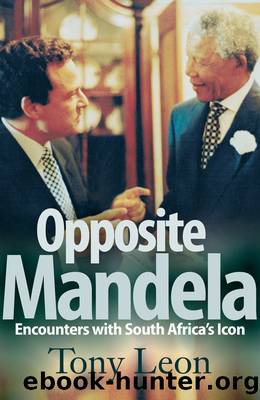Opposite Mandela by Tony Leon

Author:Tony Leon
Language: eng
Format: epub
Tags: Biography: historical political and military
Publisher: Jonathan Ball Publishers
Published: 2014-09-18T00:00:00+00:00
CHAPTER TWELVE
Golden Moments
EARLY ONE SPRING morning in late September 1995, the stillness of an ocean-facing apartment in Clifton, one of the most sought-after enclaves on Cape Townâs Atlantic seaboard, was abruptly disturbed by the ringing of a bedside telephone. The apartment belonged to veteran parliamentarian Colin Eglin and his wife, Joyce, who happened to be alone at home at the time. She was startled enough by the call at that hour, but more so when she picked up the receiver.
âGood morning, Mrs Eglin,â the caller said. âItâs Mandela here â is Colin home?â
In her retelling of the telephone tale, Joyce (who sadly died some two years later, in August 1997) didnât believe him, certain that it must be a practical joke. Only once Mandela had managed to convince her, drawing on his considerable powers of persuasion, did she inform him that her husband was overseas.
âWell,â the president said cheerily, âI just wanted to wish you both a very happy Rosh Hashanah,â his call coinciding with the Jewish New Year festivities then in progress.
After a brief, perhaps slightly embarrassed, pause, Joyce was obliged to disabuse him: âActually, Mr President, Colin and I are both Methodists.â
Now there was some perplexed hesitation at the presidentâs end. âOh,â Mandela confessed, âbut I thought, with all those years as member of parliament for Sea Point, that Colin and you were Jewish.â Indeed, the constituency Colin had represented since 1974 was significantly Jewish in its demographic make-up; hence Mandelaâs mistaken assumption.
Joyce recovered quickly enough, however, and suggested to Mandela: âPerhaps you should call our party leader, Tony Leon. He is actually Jewish, you know.â
âDonât worry,â Mandela informed her with no-doubt-renewed confidence, âheâs next on my list.â
Moments later â and 1 400 kilometres away in Orange Grove, Johannesburg â I indeed received Mandelaâs warm wishes for the New Year. And, doubtless, thereafter he rang many other surprised and delighted denizens of South Africaâs Jewish community.
This by no means isolated vignette captures the essence of Mandelaâs generous spirit of inclusivity; his ability to reach across the divisions of language, race, religion, politics and culture to make the âRainbow Nationâ a reality (a term coined by Archbishop Desmond Tutu). In a general, rather than religious, sense, he was an ecumenical first citizen.
Many years later, I heard an account of how Mandelaâs predecessor and, later, deputy president, FW de Klerk parried the curved-ball question thrown at him as to which of the two had been the better president. With a combination of dexterity and diplomacy, De Klerk responded: âIn terms of administration I was the better president, but as the leader of a nation he was the better one.â
Indeed, Mandela, rather like Ronald Reagan across the Atlantic and some years earlier, had a brilliant ability to paint the broad canvas on which he wanted his administration to be portrayed and remembered by posterity, and he certainly omitted no colours or shades from his palette. Like Reagan and, except where some intense personal or political interest was involved, Mandela did not
Download
This site does not store any files on its server. We only index and link to content provided by other sites. Please contact the content providers to delete copyright contents if any and email us, we'll remove relevant links or contents immediately.
The Secret History by Donna Tartt(16762)
The Social Justice Warrior Handbook by Lisa De Pasquale(11517)
Thirteen Reasons Why by Jay Asher(7857)
This Is How You Lose Her by Junot Diaz(5845)
Weapons of Math Destruction by Cathy O'Neil(5096)
Zero to One by Peter Thiel(4888)
The Myth of the Strong Leader by Archie Brown(4821)
Promise Me, Dad by Joe Biden(4494)
Beartown by Fredrik Backman(4490)
How Democracies Die by Steven Levitsky & Daniel Ziblatt(4467)
Stone's Rules by Roger Stone(4458)
The Fire Next Time by James Baldwin(4399)
100 Deadly Skills by Clint Emerson(4129)
A Higher Loyalty: Truth, Lies, and Leadership by James Comey(4074)
Rise and Kill First by Ronen Bergman(4065)
The David Icke Guide to the Global Conspiracy (and how to end it) by David Icke(3935)
The Farm by Tom Rob Smith(3910)
Secrecy World by Jake Bernstein(3829)
The Doomsday Machine by Daniel Ellsberg(3773)
